2019 began with a UK trustee visit in Jakarta at the posyandus and Paud centres we have been supporting together with the Australian government. KSF welcomes new team members: Reni Agustina and Clarissa Jazzlyne!
Download the newsletter as a PDF
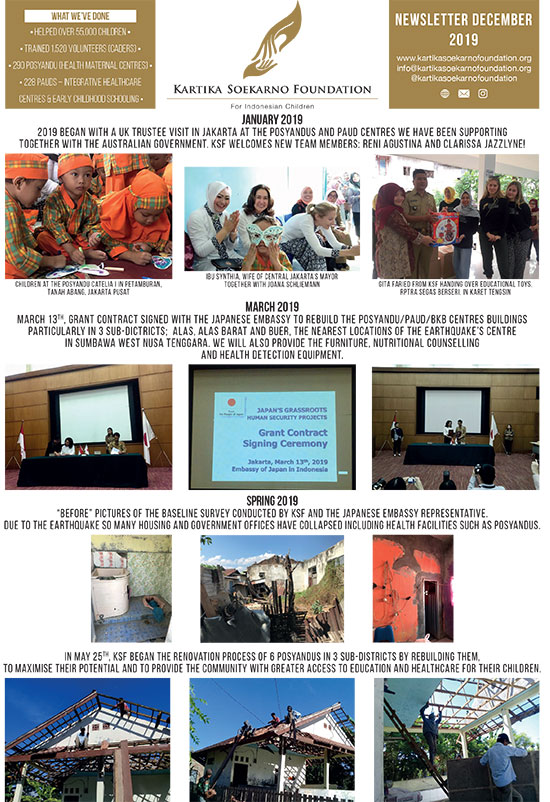
2019 began with a UK trustee visit in Jakarta at the posyandus and Paud centres we have been supporting together with the Australian government. KSF welcomes new team members: Reni Agustina and Clarissa Jazzlyne!
Download the newsletter as a PDF

This year, KSF has achieved great results in boosting the quality of basic education in East Java, helped reduce the high rates of infant mortality, young child malnutrition and ill health in the poorest parts of Eastern Indonesia. Our ethos of engaging local governments to fund and replicate our model ensures an organic national development. Peace and Joy for 2019.
Download the newsletter as a PDF
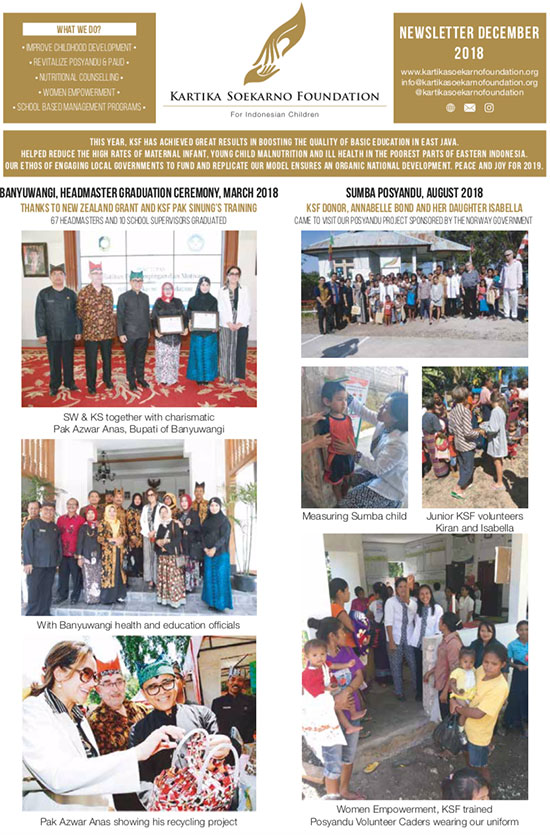
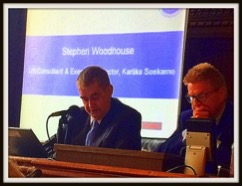
Stephen Woodhouse OBE addressing the panel
KSF is proud to share the news that KSF’s Executive Director, Stephen Woodhouse, was invited to speak at the Annual Commonwealth Day Seminar at the House of Lords about the role of education in emerging economies.
Stephen chose to highlight KSF’s success in local communities with their bi-focal approach of safeguarding early childhood health and optimising schools with KSF teacher training.
Although Indonesia is not part of the Common Wealth, the audience as well as the panel was eager to hear about the KSF approach and to discuss the possibilities of emanating this formula.
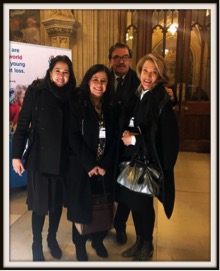
Celebrating KSF at Commonwealth Day at the House of Lords:
Founder Kartika Soekarno Seegers, Guest of Honour, Ms Hana Satriyo, who has recently arrived in London with her husband Ambassador Rizal Sukma, and Trustees Brian Sanderson and Joana Schliemann.
2015 brought KSF new government grants from Australia and the Kingdom of Norway. Thanks to their support, we will expand our posyandu revitalization programs (local community centres for early childcare, health and nutrition) in the poorest areas of Jakarta and West Sumba.
2 years program from 2015 to 2017, Central Jakarta.
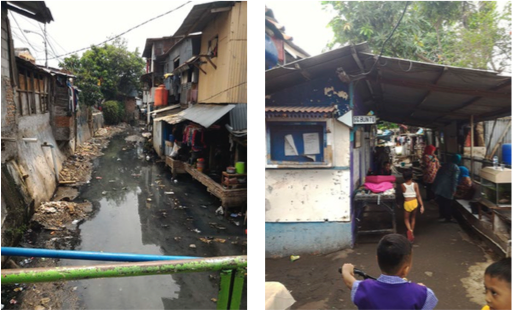
Visit to Posyandu Nusa Inda, located in central Jakarta. This village Kebon Melati is the home for 800 families in an area of not more than 16,000 sq metres.
2 year program from 2015 to 2017, West Sumba

Stephen Woodhouse meeting with the local Cadres in Katamawee village, East Nusa Tenggara. These ladies are volunteers working in the maternal health centers. Their knowledge in health and nutrition is still very limited. It will be Sari’s goal to change this, so that many young mothers and babies will benefit. The cadres capacity and community knowledge about nutrition and healthcare are still low.
99% of rural pregnant women are malnourished and anemic, thus resulting in weak body conditions and low birth- weight babies. Many of these babies die of dehydration from diarrhea and diseases.
We will have the full cooperation of the local authorities to tackle this dramatic malnutrition issue and to improve early health and education for young mothers, babies and children. Our pilot projects are selected by the area with the highest level of malnutrition and rates of maternal and infant diseases. The Norwegian Embassy in Indonesia is already working in Sumba to improve the electric outreach for this remote, poor and dry island.

KSF members working with the local government of cials in resolving health, nutrition and early childcare of mother and children issues through the Posyandu Revitalisation program.
Teacher training program in primary schools in Surabaya.
Thanks to the generosity of the Government and people of New Zealand, KSF has been able to initiate a program to improve learning outcomes in more than 200 primary schools serving in excess of 50.000 primary school age +children from low income families in Surabaya. The main focus is to equip school heads with the necessary knowledge and skills to promote better links with and support from local community leaders and parents; to manage schools in a more transparent and learning results oriented manner and to strengthen teachers capacities to promote a child focused learning paradigm. There is strong involvement of local Government such that we expect that KSF pioneering interventions will lead to full replication using funds managed by Government and other donors.
As you can see KSF has been very active over the last few years and we are very grateful to Japan for their continued support in the area of Gianyar.
Next March, I will visit all the projects sponsored by our “blue chip” government donors. We appreciate ongoing support from individual philanthropists and look forward to their even greater support in 2016 and beyond.
Download the newsletter as a PDF
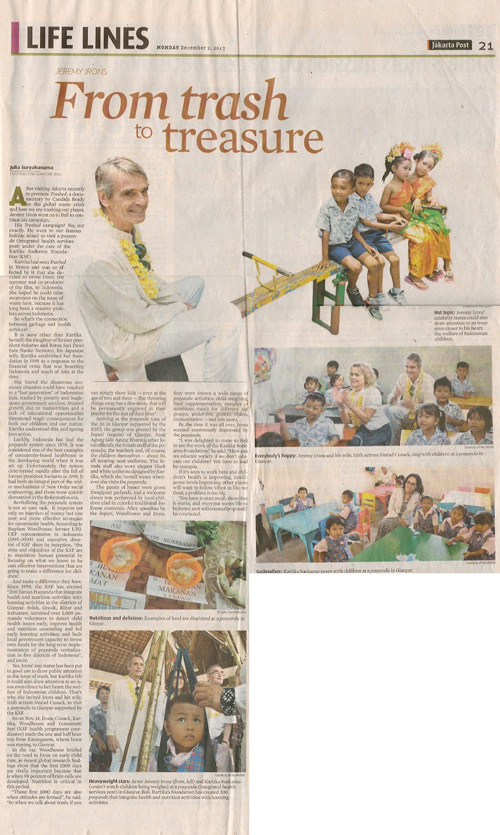
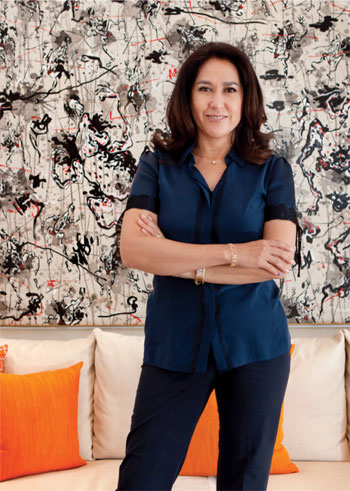
Kartika Soekarno — daughter of former President Sukarno and his Japanese wife Naoko Nemoto, known as Ratna Sari Dewi—was once banned from entering Indonesia. His successor President Suharto also did not allow Sukarno’s children to meet their late father. This political pressure apparently deeply impressed and made the young Kartika want to return to the country even more.
She is now living in Jakarta and actively supporting more than 200 posyandu — an abbreviation for pos pelayanan terpadu, a child and maternal clinic —in Java, Bali and Sumatra to help fight for malnutrition, one of the largest infant problems in Indonesia. According to the government, eight million babies and toddlers are malnourished. Through her Kartika Soekarno Foundation (KSF), she has channeled $117,000 of the Japan government’s funds last year to improve the clinics’ service and revitalize 49 posyandu.
“We have trained about 1,000 volunteers, and also provide basic healthcare such as immunization for expectant mothers, babies and toddlers. The ages zero to five is a crucial time for children to get good nutrition because of the impact on their health and brain development,” says Kartika who founded KSF in New York 16 years ago.

Kartika is a role model for independent women. She sometimes travels alone to the locations to visit her projects, from a small town of Solok in West Sumatra to Gianyar in Bali. She says the volunteers who work for the posyandu always impress her.

Her interest in posyandu started after she visited several clinics in Subang, West Java, in September 1999. Kartika, who at the time lived in New York, was a member of the U.S. National Committee for Unicef. Later she returned to observe clinics in a slum area of Jakarta for the same project. Together with a Dutch top model Annette Lauer, she raised hundred of thousands of dollars for this healthcare project.
As a prominent figure, Kartika can help raise money for charities. For example, she helped Unicef raise $180,000 through a charity event to fund the improvement of education for Indonesian children in remote areas. Currently, she is a member of the American Foundation of Venetian Heritage, which organizes the Venice Art Biennale, and collects funds for the architectural restoration of the city.
Last year, she brought English actor Jeremy Irons to Jakarta and Bali to visit the posyandu while also promoting Irons’ environmental documentary film “Trashed” in 39 cities in Indonesia. The film talks about global waste, and features Jakarta’s Ciliwung River and Bali’s beaches as examples of global pollution. “It’s an important message for Indonesia as there is a difficult situation with the trash here,” she says.
During her childhood, Kartika grew up living in many countries. She was born in Tokyo 47 years ago. Although she is an Indonesian citizen, her mother lived in Paris and Switzerland because of the un- certain political conditions in Indonesia. She doesn’t speak Indonesian fluently; instead she is able to speak English, French and Japanese well. Like her mother, she loves fashion: some of her favorites are Prada, Dries Van Noten and Gucci.
After the death of her father in 1970, she was able to visit Jakarta and sometimes stayed in her stepmother’s house, Hartini Soekarno, or her half sister’s, former President Megawati Soekarnoputri. Kartika has a very close relationship to Megawati, who witnessed her wedding to a Dutch banker Frits Frederik Seegers, now chief executive of Chairul Tanjung’s CT Corp., in Amsterdam in 2005.
“Mbak Mega is a person that I admire. She can act either as a good mother, a politician or as a leader,” says Kartika. Although most of Sukarno’s children are involved in politics, Kartika feels more comfortable as a social activist. Her philanthropy roots go back to a U.S foundation she supported to help the homeless in New York. Before, she was a TV journalist in Tokyo. In 1998, when Indonesia was hit by the financial crisis, she established her own foundation, KSF, with support from Unicef and CARE.
“Jakarta has changed. There are many ultra rich families here, while the middle class is also growing. But, in the other places, there are still people who need help. That’s why our efforts are with children from poor families, to help them have a good education and health,” she says.
In education, KSF has prevented more than 1,900 students from dropping out. It also trained hundreds of teachers in 75 primary schools in Gianyar, Blitar, Kebumen, Trenggalek and Solok. Her foundation also provides scholarships for secondary students to continue their studies at vocational schools. “We also provided grants for schools because the teachers sometimes are not very well paid or not motivated, so we train them to improve the quality of education. When children enjoy going to school, more children can be saved from dropping out,” she says.
Kartika funds her foundation with grants from the Japanese government and other international donors, as well as from private and corporate donations, such as from Freeport, Citibank and BCA.
Art|Jog is a unique art fair as it is organized by artists for artists to meet collectors directly, without the intermediary of galleries.
It has become the most popular art fair in Indonesia and this year’s theme is “Legacies of Power”. It is a very timely theme.
When asked to officiate Art|Jog this year, I was honored but was also unsure. I had just returned from London and had no nanny for two weeks, so it looked difficult.
But then I saw the date — June 7 — just one day after my father’s birthday on June 6, and I thought what better way to celebrate his birthday!
My late father, the country’s first president Sukarno, was not just a leader who led the struggle for Indonesia’s independence. He also loved the arts and was one of the first Southeast Asian art collectors.
I just wonder where his collection is today and I wish it was more accessible to the public.
My father collected the work of so many Indonesian artists for the sheer love of it and to inspire people to consider their own art, develop it, promote it and value the richness of art and of artists in society.
Artists should be embraced, not feared, and my father did just that. Artists are the only ones who can communicate and express the Pancasila concept of harmony between different religions and the concept of Bhinneka Tunggal Ika (unity in diversity), which is the basis for peace in Indonesia.
Artists require freedom of expression, which is at the root of an open society. By artists, I mean not only painters, sculptors, poets, writers, performers, musicians and filmmakers but also artisans and publishers.
Maestros like Affandi, Hendra Gunawan and Sudjojono have participated in the struggle for independence while painting.
Our history, in the 1960s, shows tension between politics and art. Indonesia has suffered decades of cultural stagnation under years of obsession with censorship and the government placing a ban on the Cultural Manifesto.
Creative freedom in Indonesia is important as it records history in a country that forgives but should not forget. Censorship is the greatest enemy of all artists and of artistic imagination and creation.
After all, art is communication and whether verbal or non-verbal, it is our most powerful tool. That is why dictators always go after the artists. Art is beyond politics and that makes it political. Artist Ai Weiwei has been questioned as China’s most dangerous man. He has been arrested and harassed.
We should soon be careful that our freedom of thought is not endangered again.
There are many ways in which artists draw attention to political and social issues. Whether it is through such overt outcries, political satire, conceptual art, theater or filmmaking.
One such important topic, the global waste crisis, was well-portrayed by the British filmmaker Candida Brady, and I have felt personally compelled to bring this film to the attention of the Indonesian public.
The waste crisis is truly global and I would like to draw attention to this in the hope it will lead to individual, regional and national action to save our planet from suffocating in plastic.
Art|Jog is the perfect arena to discuss and raise awareness of important issues as the event’s host city, Yogyakarta, has become the country’s capital for arts and culture and is drawing international attention.
Art enriches social and political life and it has a lot of potential in Indonesia. As a country with huge natural resources and a young population, let us not forget to foster our artistic talent with all the diverse messages it might bring along.
We are on the eve of our next presidential election and I would like to quote Iranian video artist Shirin Neshat’s message in Davos this year to her president: “Mr. President, take care of your artists, your intellectuals and accept that art is no crime, that it is every artist’s responsibility to make art that is meaningful, that questions tyranny, that questions injustice. It is the artist’s task to advocate change, peace and unity”.
On behalf of my father, I am grateful for events like Art|Jog for continuing the work he could not finish and for encouraging freedom of thought and creativity for all Indonesian artists.
— Kartika Soekarno
Sun, May 25 2014, an article written by Kartika Soekarno in the Jakarta Post:
I recently had a chance to spend the day with Tri Rismaharini, the woman who is the famous incumbent mayor of Surabaya, East Java.
Following a pleasant meeting in Jakarta, where we shared our visions for better primary school education and better environmental conditions in Indonesia, we vowed to meet again soon.
Ibu Risma kindly invited me to visit Surabaya for a closer look at her work, so it was with mild anticipation (or nervousness) that I met her again at her official residence in Surabaya.
The anticipation (or nervousness) I felt came from a breaking news report about an outburst following the damages wrought to the city’s Bungkul Park during a free ice-cream day.
Risma was on time — a good start. After discussing a potential project together, she showed me a diverse collection of handicrafts made in Surabaya, ranging from glasses, baskets woven from banana leaves and batik.
The mayor then obliged my request for a personal tour of the city.
However, with a little embarrassment, Risma asked that we use my car instead of hers and then we started with a stop at Ekspresi Park.
I was impressed by the cleanliness of the park, which lies near the Brantas River. There was garbage neither in the water nor on the grass.
The children’s library was a clean, well-organized place with books on languages, human anatomy, geography, flags and more. Children were seated around a table learning English and playing educational games.
Elsewhere in the park were carved wooden letters as well as statues of various characters from Indonesian history, including Prince Diponegoro and heros from the period of the Japanese occupation and the Proclamation of Independence.
I have never seen such a clever idea for a park, combining recreation with education.
As we proceeded, I noticed many adults and children stopped to pay their respects to the mayor, who was very approachable.
We continued to a clean and air-conditioned language learning center that also offered computer classes. Some students were busy learning English while others learned how to use presentation software.
Next was a youth center with another children’s library and an educational playground where parents and children mingled and read books together.
In another room, some young women in jilbabs were rehearsing for a contemporary musical. For a moment, I thought I was at the Venice Biennale.
We ended the tour with a visit to the house of H.O.S Tjokroaminoto, where my father stayed during his student years.
Tjokroaminoto was Sukarno’s spiritual independence leader. Risma prided herself on often taking children to the house to explain that their first president — a man who became a world leader — began his life in this modest house.
On the same street was the first bookstore where my father apparently borrowed books. On behalf of the government, Risma took the initiative to turn the house into a historical site.
I was happy to have a glimpse of what an old Javanese street looked like and to see a simple yet elegant period building. The woman has a sense of history and pride.
Could we clone her to stop the sale of land around Borobudur temple? Apparently, 24,000-square meters of land were recently sold off to three separate investors, one foreigner and two from Jakarta.
It’s reckoned that about 10 “investors” come knocking each day. There is not a hill overlooking the temple that has not already been bought as land for future hotels.
Soon, Borobudur, Indonesia’s gift to her children and to the world, will rest in a lake, not of lotus flowers, but of tasteless hotels — employing people from afar and complete with Bali-style villas wrapped in three-meter-high walls.
Borobudur is not Angkor Wat. The monument does not benefit from the protection of a 400-square-kilometer archaeological site. And this is exactly what Borobudur needs.
Back in Surabaya, after a beautiful day together, Risma entered her car. While we were waving goodbye, she jumped out to tell me why she did not want to use her vehicle show me the city.
It was full of toys, soccer balls and children’s rain boots. Risma showed me the items one by one, explaining that she was distributing the items herself to needy children and that her car was not suitable to host me.
These were my last images of Ibu Risma, a hands-on mayor close to the people’s hearts.
— Kartika Soekarno
http://www.thejakartapost.com/news/2014/05/25/by-way-a-grand-day-out-with-mayor-risma.html
The world-famous actors and producers Jeremy Irons and Sinead Cusack proved their credentials as social activists during a visit to Gianyar last week to observe the work of the Kartika Soekarno Foundation (KSF). Kartika herself lead the tour starting off from Villa Idanna in the idyllic setting of central Karangasem to Kengetan in Gianyar, where KSF has been revitalising and improving the Posyandu system. The KSF model adds in early childcare activities in addition to the nutrition and health improvement for infants and young children that represents the traditional work of the Posyandus. During the long journey between the villa and the Posyandu, Jeremy and Sinead listened very carefully to the briefing provided by Kartika and by Steve Woodhouse (KSF Executive Director). Kartika and Steve explained why Posyandus represent such sound investments in maximising the potential of infants and young children and discussed the management of the Posyandus. It was impressive that Jeremy and Sinead asked such probing questions during the mobile briefing and caused the stunning scenery being driven through to take second place to the briefing!
Upon arrival at the Posyandu, the visitors toured the facilities and were clearly very impressed with the high level of motivation of the Posyandu volunteers. Kartika earlier had designed unique and highly attractive uniforms for all volunteers which they wear with great pride, especially knowing that Kartika herself similarly proudly wears the uniform!
Jeremy and Sinead evinced strong interest in the development of life skills and attitudes in the early child care section of the Posyandu. The development of initiative, creativity, self esteem and self confidence, along with social and communication skills, come from the way the children aged 3-5 learn and play at the Posyandu. These attitudes remain life-long so again Jeremy and Sinead could see how useful the work of KSF is in ensuring that the potential of young children is maximised.